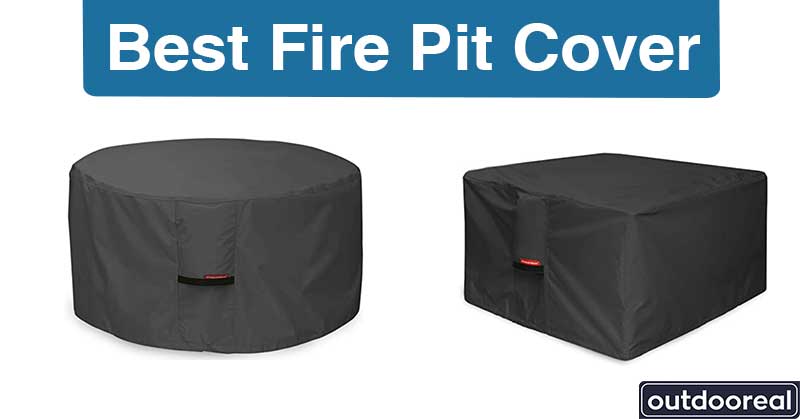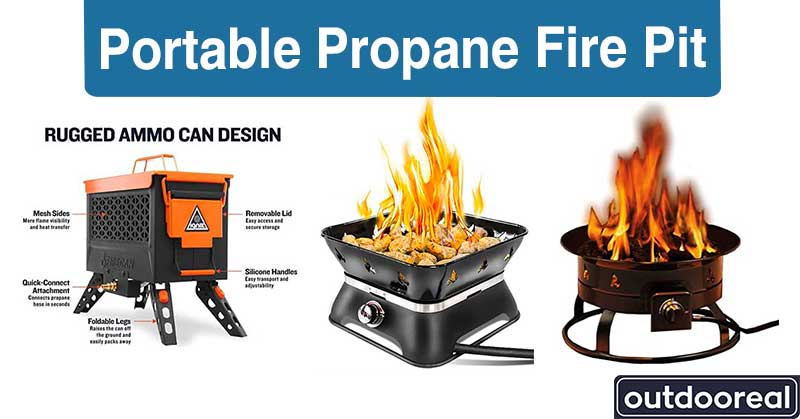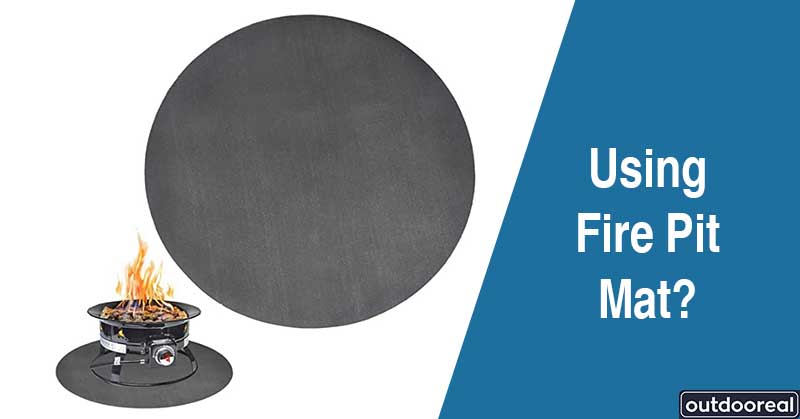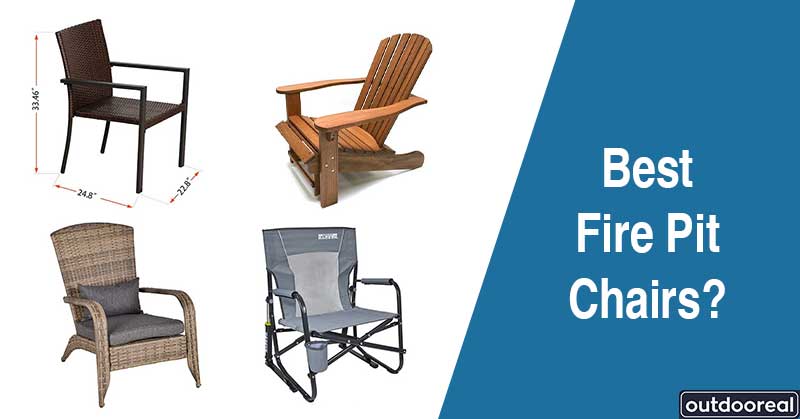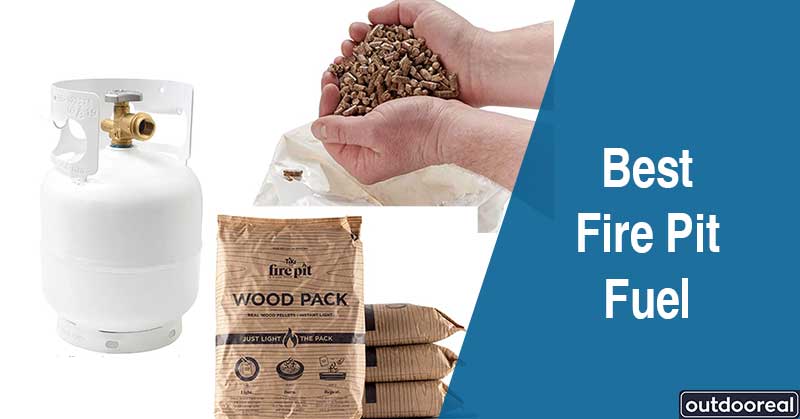Yes, propane or gas fire pits can get wet if left outside for a long time. Your propane fire pit can get caught in a sudden shower or storm. Also, the buildup of moisture from the air can get it wet. The burners on a gas fire pit are prone to becoming clogged up by humidity, making them unusable or even causing them to corrode. To further avert these issues, preventative steps must also be performed.
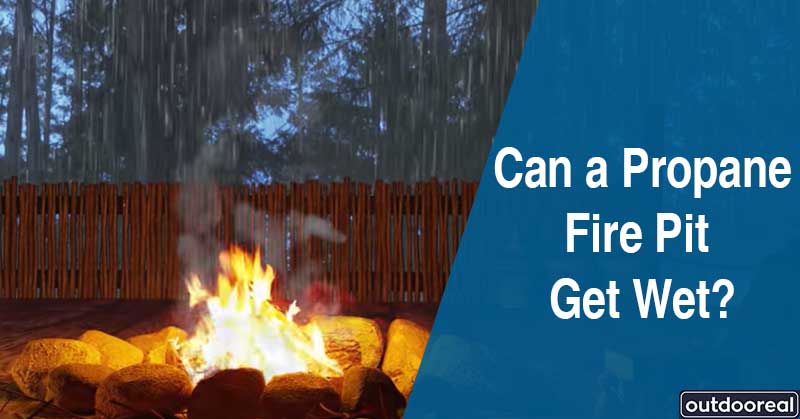
Can My Fire pit Handle the Rain?
Outdoor propane fire pits are built to withstand the weather, including the wind, rain, and snow. However, no fire pit can be kept out in the rain, whether it burns wood or propane. When exposed to rain for a lengthy period, propane gas fire pits degrade. Contamination in gas burners is the most likely cause of damage. A wood fire pit that collects a lot of ash and water will corrode quickly and become a nightmare to clean. Further, you won’t be able to use the fire pit until it dries completely, which typically takes 48 to 72 hours.
What Happens if My Propane Fire Pit Gets Wet?
You should not overthink the longevity of your fire pit if it is caught in a brief rainstorm for no more than two to three hours. However, exposing your fire pit to the elements, especially water, for a lengthy period can substantially shorten its lifespan.
There are two main consequences associated with leaving a propane fire pit wet:
Formation of Rust:
Rusting is a horrible problem that no one likes to deal with, and it happens when there is too much moisture in a propane fire pit. Fire pits made of stainless steel or cast iron won’t rust over time, but excavations made of other materials can, if left in the rain for too long.
Gas line clogging:
In addition to generating rust, water may also cause corrosion, which can block the pipes of a propane tank or cause the metals to deteriorate. These are two more undesirable conditions for your fire pit. If your propane fire pit is exposed to weather, the ignitor and pipes from which the gas and flames emanate might be damaged.
Blocked gas burners are a common issue. If any drips of water or moisture land on the burner, it will likely not catch fire. If you manage to get the fire pit going, it will make a popping noise and will not last very long.
What Should I do Next if My Fire Pit Gets Rained?
The following action is to clean and dry it as fast as possible. It is better to protect the fire pit from getting wet; however, accidents happen. So, here is a simple and short guide on how you can clean and dry if your fire pit gets rained:
- Scrub the interior of the fire pit with warm soapy water and a gentle cloth.
- Thoroughly rinse the soap and water.
- Utilize a dry cloth to dry the fire pit. Leaving water to linger in a metal fire pit after cleaning might create rust, so avoid doing so.
- Let the fire pit dry for about 4-2 hours; do not use it before it gets scorched.
Does a Fire Pit Cover Help?
A fire pit cover is a savior for the fire pit from moisture and humidity. And, all fire pits, not only gas ones, should be enclosed for safety reasons. While steel, aluminum, cast iron, and metal make up most fire pit materials. Therefore, metal will eventually rust even if it is never exposed to direct moisture. This is the best way to extend the life of your gas fire pit and protect it from the harmful effects of air moisture. Covers for fire pits shield the fire from precipitation and the pit from humidity in the air.
After your fire pit has cooled, a cover will shield it from rain, sunshine, and animals. In addition, using a protective cover to prevent corrosion and discoloration helps extend the life of your fire pit.
Does Getting Wet Create Rust on My Fire Pit?
Yes, getting wet will create rust in your fire pit. Outdoor fire pits are usually designed considering weather factors, but no fire pit will withstand if it gets wet, as most fire pits are made of metal. A tiny quantity of water coming into touch with your gas fire pit is of no consequence, and nothing will be damaged. However, if the fire pit is exposed to the weather for lengthy periods, it will deteriorate.
Here is another article for you- Is it ok to use a rusted fire pit?
How to Stop Damage/Rust from Water/Moisture
Rust is the oxidation-generated, flaky reddish or yellowish-brown covering of iron oxide. Steel, iron, and other metals often rust when heat, moisture, and water are exposed. As a result, its qualities degrade with time, and one consequence of the fire pit is the development of holes, which diminishes its efficacy. Rusting and other forms of damage are among the many changes that can occur to a fire pit when it is constantly heated. So, while buying a fire pit, it is better to check the detail, if the fire pit can withstand outside weather and its metal quality.
Now, if you are wondering about the way to stop rusting or damage to the fire pit from moisture, check the following guidelines:
- Store the fire pit indoors when not in use
- Always put a cover when you are not using the fire pit.
- Do maintenance checks and cleaning every three weeks
- Remove debris, waste, and ashes after each usage, especially if you cook or roast some marshmallows on it.
- Clean the leftover food stains and wastes.
- Clean and dry the firepit quickly when it gets caught in the rain
Tips to Protect Your Fire Pit from Getting Wet
It is better to protect the fire pit from moisture or rain before it gets rusty and increases your problems. See below for some easy and valuable tips on how to protect the fire pit dry from getting wet:
Do maintenance cleaning:
If you use the fire pit more often, you might clean and dry it regularly. However, cleaning and wiping it every three weeks is better if you do not use the fire pit for a long time. Wiping with a dry cloth will keep it completely dry from the moisture buildup.
Use a fire pit cover:
The safest approach to prevent water from getting into your fire pit is to cover it. It is easy to find and install a vinyl or metal cover. Also, they prevent the buildup of dust and moisture in the air. Finally, a fire pit cover will keep the pit clean and dry until the next gathering.
Store It Away Indoors:
Only choose this if your fire pit is portable; once it has cooled down, it is best to keep it inside your home. Additionally, it will protect it from moisture.
Put up a tent:
A tent can serve as a makeshift fire pit cover if you do not own it or can not find the official one. After you finish the fire pit, it is time to set up camp. It will not prevent all rain from getting into the fire pit, but it will help.
Hope this helps. Please let us know your thoughts in comments section below.

